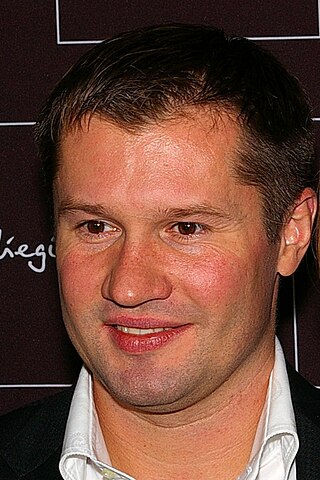
Gymnastics is a type of sport that includes physical exercises requiring balance, strength, flexibility, agility, coordination, artistry and endurance. The movements involved in gymnastics contribute to the development of the arms, legs, shoulders, back, chest, and abdominal muscle groups. Gymnastics evolved from exercises used by the ancient Greeks that included skills for mounting and dismounting a horse, and from circus performance skills.

Rhythmic gymnastics is a sport in which gymnasts perform individually or in groups on a floor with an apparatus: hoop, ball, clubs, ribbon and rope. The sport combines elements of gymnastics, dance and calisthenics; gymnasts must be strong, flexible, agile, dexterous and coordinated. Rhythmic gymnastics is governed by the International Gymnastics Federation (FIG), which first recognized it as a sport in 1963. At the international level, rhythmic gymnastics is a women-only sport.

Artistic gymnastics is a discipline of gymnastics in which athletes perform short routines on different types of apparatus. The sport is governed by the Fédération Internationale de Gymnastique (FIG), which assigns the Code of Points used to score performances and regulates all aspects of elite international competition. Within individual countries, gymnastics is regulated by national federations such as British Gymnastics and USA Gymnastics. Artistic gymnastics is a popular spectator sport at many competitions, including the Summer Olympic Games.

Alexei Yurievich Nemov is a former artistic gymnast from Russia. During his career, he won five world championships, three European championships and twelve Olympic medals.
At the 2000 Summer Olympics, three different gymnastics disciplines were contested: artistic gymnastics, rhythmic gymnastics, and trampoline. The artistic gymnastics and trampoline events were held at the Sydney SuperDome on 16–25 September and 22–23 September, respectively. The rhythmic gymnastics events were held at Pavilion 3 of the Sydney Olympic Park on 28 September – 1 October.

At the 1996 Summer Olympics, two different gymnastics disciplines were contested: artistic gymnastics and rhythmic gymnastics. The artistic gymnastics events were held at the Georgia Dome from July 20–25 and July 28–29. The rhythmic gymnastics events were held at Stegeman Coliseum in nearby Athens, on the campus of the University of Georgia from August 1–4.

Paul Elbert Hamm is a retired American artistic gymnast and member of the United States men's national artistic gymnastics team. He is the 2004 Olympic all-around champion, a three-time Olympic medalist, and the 2003 World all-around champion. Hamm is the most successful American male gymnast in history, one of only two American gymnasts to win the all-around title at both the Olympics and the World Championships, and the only male American gymnast to do so.

Gymnastics events have been contested at every Summer Olympic Games since the birth of the modern Olympic movement at the 1896 Summer Olympics in Athens. For 32 years, only men were allowed to compete. Beginning at the 1928 Summer Olympics in Amsterdam, women were allowed to compete in artistic gymnastics events as well. Rhythmic gymnastics events were introduced at the 1984 Summer Olympics in Los Angeles, and trampoline events were added at the 2000 Summer Olympics in Sydney.
At the 1988 Summer Olympics, two different gymnastics disciplines were contested: artistic gymnastics and rhythmic gymnastics. The artistic gymnastics events were held at the Olympic Gymnastics Hall in Seoul from September 18 through 25th. The rhythmic gymnastics events were held at the same venue from September 28 through 30th.

The men's individual all-around competition was one of eight events for male competitors in the artistic gymnastics discipline contested in the gymnastics at the 2004 Summer Olympics in Athens. The qualification and final rounds took place on August 14 and August 18 at the Olympic Indoor Hall. There were 98 competitors from 31 nations. Each nation could enter a team of 6 gymnasts or up to 2 individual gymnasts. The event was won by Paul Hamm of the United States, the nation's first victory in the men's all-around since the 1904 Games in St. Louis and second overall. It was the first medal of any color for an American in the men's all-around since the 1984 Games in Los Angeles. South Korea took two medals, a silver for Kim Dae-Eun and a bronze for Yang Tae Young. The scoring of the final was disputed; Olympedia calls this "the most controversial men's gymnastic event ever."

The men's horizontal bar competition was one of eight events for male competitors of the artistic gymnastics discipline contested in the gymnastics at the 2004 Summer Olympics in Athens. The qualification and final rounds took place on August 14 and August 23 at the Olympic Indoor Hall. There were 79 competitors from 29 nations, with nations competing in the team event having up to 5 gymnasts and other nations having up to 2 gymnasts. The event was won by Igor Cassina of Italy, the nation's first victory in the horizontal bar and first medal of any color in the event since 1928. Paul Hamm took silver, the United States' first horizontal bar medal since 1992. Bronze went to Isao Yoneda of Japan, the once-dominant nation's first medal in the event since 1984.

The men's parallel bars competition was one of eight events for male competitors of the artistic gymnastics discipline contested in the gymnastics at the 2004 Summer Olympics in Athens. The qualification and final rounds took place on August 14 and August 23 at the Olympic Indoor Hall. There were 81 competitors from 31 nations, with nations competing in the team event having up to 5 gymnasts and other nations having up to 2 gymnasts. The event was won by Valeriy Honcharov of Ukraine, the nation's second victory in the parallel bars. Hiroyuki Tomita took silver, putting Japan above the Soviet Union on the all-time medal table for the event. Li Xiaopeng of China became the seventh man to win multiple parallel bars medals with his bronze adding to his 2000 gold.

The men's pommel horse competition was one of eight events for male competitors of the artistic gymnastics discipline contested in the gymnastics at the 2004 Summer Olympics in Athens. The qualification and final rounds took place on August 14 and August 22 at the Olympic Indoor Hall. There were 80 competitors from 31 nations, with nations competing in the team event having up to 5 gymnasts and other nations having up to 2 gymnasts. The event was won by Teng Haibin of China, the nation's first victory in the pommel horse since 1984 and second overall. Marius Urzică of Romania took silver to become the first man to win three medals on the pommel horse. Takehiro Kashima put Japan back on the pommel horse podium for the first time since 1988 with his bronze.

The men's vault competition was one of eight events for male competitors of the artistic gymnastics discipline contested in the gymnastics at the 2004 Summer Olympics in Athens. The qualification and final rounds took place on August 14 and August 23 at the Olympic Indoor Hall. There were 79 competitors from 30 nations, with nations competing in the team event having up to 5 gymnasts and other nations having up to 2 gymnasts. The event was won by Gervasio Deferr of Spain, the third man to successfully defend an Olympic title in the vault and sixth man to win multiple medals of any color. Latvia and Romania each earned their first men's vault medals, with Evgeni Sapronenko's silver and Marian Drăgulescu's bronze, respectively.

The men's artistic individual all-around competition at the 2008 Summer Olympics was held at the Beijing National Indoor Stadium on August 9 and 14. There were 98 competitors from 35 nations. The event was won by Yang Wei of China, the nation's first victory in the event since 1996 and second overall. Yang, who had earned silver in 2000, was the 13th man to receive multiple medals in the individual all-around. Japan's Kōhei Uchimura took silver; it was the first medal in the event for Japan since 1984, the last of a four-decade stretch where the nation reached the podium every time it competed. Benoît Caranobe of France took bronze, the first men's all-around medal for that nation since 1920.

The men's parallel bars competition at the 2008 Summer Olympics was held on August 9 and 19 at the Beijing National Indoor Stadium. The eight competitors with the highest scores in qualifying proceeded to the men's parallel bars finals. There, each gymnast performed again; the scores from the final round determined the final ranking. There were 75 competitors from 27 nations that competed on the parallel bars, with nations in the team event entering up to 5 gymnasts while other nations could enter up to 2. The event was won by Li Xiaopeng of China, the first man to win three medals in the parallel bars as well as the first man to win two non-consecutive gold medals in the same apparatus. Yoo Won-Chul of South Korea took silver. Anton Fokin won Uzbekistan's first parallel bars medal in its debut as an independent nation.

The men's horizontal bar competition at the 2008 Summer Olympics was held on 9 and 19 August at the Beijing National Indoor Stadium. The eight competitors with the highest scores in qualifying proceeded to the men's horizontal bar finals. There, each gymnast performed again; the scores from the final round determined final ranking. There were 76 competitors from 27 nations that competed on the horizontal bar, with nations in the team event entering up to 5 gymnasts while other nations could enter up to 2. The event was won by Zou Kai of China, the nation's first victory in the horizontal bar. Jonathan Horton won silver, the United States' second consecutive Games with a silver medalist in the horizontal bar. Germany's Fabian Hambüchen won the first of his three medals in the event with bronze.

The men's parallel bars competition was one of eight events for male competitors in artistic gymnastics at the 2000 Summer Olympics in Sydney. The qualification and final rounds took place on September 16 and 25 at the Sydney Super Dome. There were 81 competitors from 30 nations; nations competing in the team event could have up to 5 gymnasts in the vault, while other nations could have up to 2 gymnasts. The event was won by Li Xiaopeng of China, the nation's first victory in the parallel bars. Lee Joo-Hyung earned South Korea's first medal in the event with his silver. Russia also received its first medal since the dissolution of the Soviet Union, with Alexei Nemov's bronze.

The men's horizontal bar competition was one of eight events for male competitors in artistic gymnastics at the 2000 Summer Olympics in Sydney. The qualification and final rounds took place on September 16 and 25 at the Sydney Super Dome. There were 79 competitors from 28 nations; nations competing in the team event could have up to 5 gymnasts in the vault, while other nations could have up to 2 gymnasts. The event was won by Alexei Nemov of Russia, the nation's first post-Soviet victory in the horizontal bar. Nemov, a bronze medalist in 1996, was the 10th man to win multiple medals in the horizontal bar. Benjamin Varonian earned France's first medal in the event since 1976 with his silver. Lee Joo-Hyung won South Korea's first medal in the event with his bronze.
Gymnastics competitions at the 2024 Summer Olympics in Paris were contested in three categories: artistic gymnastics, rhythmic gymnastics and trampolining. The artistic and trampoline events occurred at the Accor Arena, with the rhythmic events staged at Porte de La Chapelle Arena from 8 to 10 August.
















